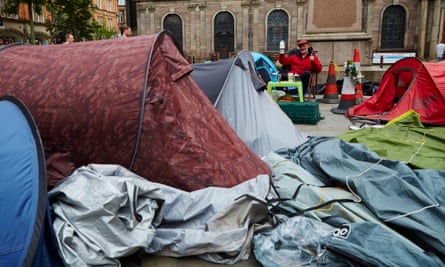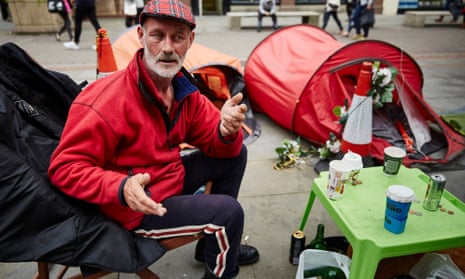Homeless people who have been camping for months in Manchester city centre in protest at the city’s growing rough-sleeping problem could be evicted on Monday if the council wins an injunction against them.
Manchester city council served a notice on the campers on Friday 19 June, ordering them to pack up their tents and leave St Ann’s Square and Castlefield. But the 20 or so protesters have refused to go, prompting the council to apply to magistrates for an injunction preventing them from settting up camp anywhere else in the city.
“We hope this will end 10 weeks of disruption to residents and businesses, as well as anti-social behaviour, which has included the burning of bonfires, vandalism, street drinking and the intimidation of members of the public,” said councillor Nigel Murphy, Manchester city council’s executive member for neighbourhoods.
The group began their protest back in April, first pitching tents outside the town hall in Albert Square. Since then, Manchester city council has been to court two times to move the groups on – initially from Albert Square, and then from outside the Central Library in St Peter’s Square.
The protestors, who have adopted the name Homeless Rights of Justice, describe themselves on their Facebook page as a ‘‘collective of activists and homeless people working together to change the way Manchester deals with the homeless’’.
But they have been criticised by homeless charities in the city. Peter Green, founder of Manchester homeless charity Barnabus, said he thought many were not “genuinely homeless” and had turned down help from the council. He said that while Manchester did have a growing rough-sleeping problem, he had noticed “a great improvement” in the council’s attitude towards homelessness.

For many weeks, a dozen tents, tied together to stop them being blown away by the wind, have been clustered at the centre of St Ann’s Square, a pedestrianised street which is home to the Royal Exchange theatre and a number of high-street shops.
Sitting on a deckchair as shoppers filed past last week, one of the campers, Paddy Reilly, 55, explained why the group was there. ‘’People cannot live off fresh air. Homeless people are going out committing offences and shoplifting to survive. Instead of spending thousands sending the homeless to prisons, why don’t they give them the keys to their own homes,” he said.
Admitting he is an alcoholic, Reilly said since he’s been at the camp he has declined accommodation at hostels offered by the council. “What they’re doing is sending them back into hostels and they’re there for a week before they’re back on the streets,” he went on. “The same type of people are mixing together in hostels, so they’re all going to do the same type of thing, like taking drugs and drinking. The council is keeping hostels in business, we want the keys to our own homes.”
The camp has shrunk in the last few weeks since a small group of campers left St Ann’s Square to pitch tents in a small field beside a railway bridge in Castlefield, by the canal. Ryan Walker,19, who started sleeping rough after leaving home age 16, said he moved to the new site having got fed up with punters leaving clubs and bars late at night “shaking tents and causing trouble”. Asked why he chose to join the homeless camp, he said: “Homeless people need to stick together.”
Shoppers at lunch time seem oblivious to the camp in St Ann’s Square. Greg Ingham, 27, a graphic designer picking up some lunch, said he doesn’t mind the camp. “They’re not causing any problems ... I don’t think they should be evicted.”
Others disagreed. “It makes the place look a mess,” said one man, while an employee from the McDonald’s opposite complained the camp attracted fights and street drinkers at night.
Cllr Nigel Murphy Manchester City Council’s executive member for neighbourhoods, said: “We have served a notice on both camps, but the protestors are still camped out so we are applying for an injunction which will stop them setting up further camps within the city centre.
‘We hope this will end 10 weeks of disruption to residents and businesses, as well as anti social behaviour which has included the burning of bonfires, vandalism, street drinking and the intimidation of members of the public.”
But how a broad injunction would be policed is unclear, should one be granted to the council.
Dr Rhetta Moran of RAPAR, a Manchester-based human rights organisation, said: “An injunction preventing someone from entering an area is, by its very nature, an interference of one’s civil liberties and should only be granted sparingly.
“It is unclear what type of injunction the council will seek. Any such injunction will restrict the movements of the person injuncted and is a very serious matter.”
A magistrate is set to decide on Monday whether to grant the injunction banning any further camps in the city.
